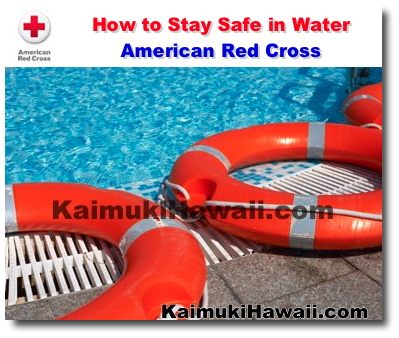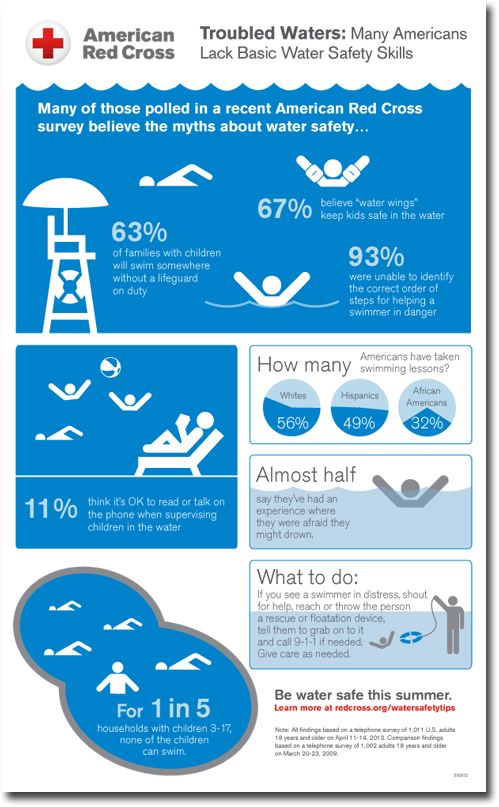American Red Cross Survey Finds People Unclear about How to Stay Safe in the Water
- Tweet


American Red Cross Survey Finds People Unclear about How to Stay Safe in the Water
Most families plan to swim in areas without lifeguards this summer, but lack basic water safety knowledge
Although nearly two-thirds of families with small children plan on swimming in areas without lifeguards this summer, many people don't know the right thing to do in water emergencies or how to keep their loved ones safe in the water, according to a new American Red Cross poll.
"Here in Hawaii, people spend time in and around the water year-round, but especially during the summer. Now is a great time to review water safety precautions so you know what to do to stay safe," said Coralie Matayoshi, Chief Executive Officer of the Hawaii State Chapter.
The survey findings show that people mistakenly believe some steps such as having a swimming buddy or flotation device will keep them safe. For example, while the Red Cross recommends that people always swim with a buddy in designated swimming areas supervised by lifeguards, buddies alone are not enough to keep swimmers safe.

Two thirds (67%) of those asked mistakenly believe that putting inflatable arm bands, or "water wings," on children is enough to keep them safe when an adult is not nearby. These are not lifesaving devices, and children and weak/inexperienced swimmers should wear U.S. Coast Guard-approved life jackets while remaining under constant adult supervision.
The Red Cross poll found 63 percent of families with children plan on swimming in an area without a lifeguard this summer. However, nearly half of those polled had never taken swimming lessons.
Nearly half of Americans say they have had an experience where they were afraid they would drown, according to the findings. Overall, four in 10 (41%) say they know someone who was in danger of drowning, which is an increase of 16 percentage points from a similar 2009 Red Cross survey.
Another concerning finding in the 2013 Red Cross survey was that most of those polled were unsure of the right steps to take when someone appears to be in distress in the water: More than nine in 10 (93%) people were unable to identify the correct order of actions to take to help a swimmer who may be in danger of drowning.
"The correct steps to take when you see a swimmer who needs help is to shout for help, reach or throw the person a rescue or flotation device and tell them to grab it; then call 9-1-1 if needed," Ms. Matayoshi said. "People think that if a person isn't calling out for help that they must not need help. However, they are likely using all their energy to just try to stay above water. People think they should enter the water to save someone, but often this endangers the life of the rescuer.
Other signs of a swimmer in trouble include:
· Treading water and waving an arm
· Doggie paddling with no forward progress
· Hanging onto a safety line
· Floating on their back and waving their arms
· Arms extended side or front, pressing down for support, but making no forward progress
· Positioned vertically in the water, but not kicking legs
· Underwater for more than 30 seconds
· Floating at surface, face-down, for more than 30 seconds
Red Cross swimming lessons help people develop skills and water safety behaviors that help people be more comfortable and safe when they are in, on and around the water. The Red Cross encourages all household members to enroll in age-appropriate water orientation and Learn-to-Swim programs. To find classes for your family, contact your local aquatic facility and ask for American Red Cross swimming programs.
An infographic highlighting survey results has been developed. People can find additional water safety information at redcross.org/watersafetytips.
Survey details: Telephone survey of 1,011 U.S. Adults 18 years and older on April 11-14, 2013 conducted in ORC International's CARAVAN® survey using a landline-cell dual-frame sampling design. Margin of error is +/- 3.1 percentage points at the 95% confidence level. For comparison, this report includes findings from a 2009 Water Safety Poll--Telephone survey of 1,002 U.S. Adults 18 years and older on March 20-23, 2009 conducted by ORC International's CARAVAN®. Margin of error is +/- 3.1 percent at the 95% confidence level.
ref no:16867
Questions? Ready for an appointment?

- KAIMUKI RELATED LINKS

American Red Cross Free Annual Summer Swim Program
Free registration with use of coupon code. Free swim lessons available for adults and keiki. Lessons are held at Magic Island, Ala Moana Beach Park near the showers and lifeguard station. More...
Kaimuki Hawaii.Com Home Page
View our featured events, news, businesses and primary links on our home page.Featured Sponsors Offers
Great offers from our sponsors who support the Kaimuki Honolulu, Hawaii community. More...Kaimuki Hawaii Directory
View Kaimuki, Hawaii primary directories. businesses, non profits, public, government and jobs.Calendar
Check out things to do in Kaimuki on the calendar of events.News
Keep up with the latest news and happenings in your Kaimuki community.Kaimuki Hawaii Featured Pages
View our directory of feature pages showcasing all the great things Kaimuki, Honolulu, Hawaii has to offer. Go Green in Kaimuki, restaurants, shopping, WiFi Hot Spots, fitness, health, real estate, home and garden, 80+ more directories... More...
Terms of Use / Legal Disclaimer / Privacy Statement
Site Designed and Managed by MacBusiness Consulting

